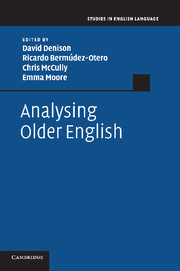Book contents
- Frontmatter
- Contents
- Figures and maps
- Tables
- Contributors
- General introduction
- Part I Metrics and onomastics in older English
- Part II Writing practices in older English
- Part III Dialects in older English
- 8 Introduction to Part III
- 9 Levelling and enregisterment in northern dialects of late Modern English
- 10 Quantitative historical dialectology
- 11 Reconstructing syntactic continuity and change in early Modern English regional dialects
- Part IV Sound change in older English
- Part V Syntax in older English
- References
- Index
9 - Levelling and enregisterment in northern dialects of late Modern English
Published online by Cambridge University Press: 05 December 2011
- Frontmatter
- Contents
- Figures and maps
- Tables
- Contributors
- General introduction
- Part I Metrics and onomastics in older English
- Part II Writing practices in older English
- Part III Dialects in older English
- 8 Introduction to Part III
- 9 Levelling and enregisterment in northern dialects of late Modern English
- 10 Quantitative historical dialectology
- 11 Reconstructing syntactic continuity and change in early Modern English regional dialects
- Part IV Sound change in older English
- Part V Syntax in older English
- References
- Index
Summary
Introduction
Socio-historical linguistics and historical sociolinguistics rely on the ‘uniformitarian principle’ that the mechanisms governing linguistic variation and change operated in past times and societies as they do today. In a seminal study, Labov (1978: 277) claimed that we can make ‘use of the present to explain the past’ and demonstrated that ‘long-standing problems of historical linguistics can be resolved only if we are willing to use general principles drawn from phonetic and sociolinguistic research’. In this sense, the past is not ‘a foreign country’ and ‘they’ do not ‘do things differently there’. Although, as Nevalainen and Raumolin-Brunberg (2003) point out, it is important not to assume that specific categorisations such as ‘middle class’ can be imposed on an analysis of historical societies, their own work demonstrates that the relationship between linguistic variation and social class in early Modern Britain was as hierarchical as it is today.
In this chapter, I test the extent to which two processes identified as important in understanding linguistic variation and change in Present-day English (and other languages) can be seen as operating in the late Modern Period. The processes concerned are dialect levelling and enregisterment. I hope to demonstrate that these two processes did indeed operate in urban areas of the north of England in the nineteenth century, and that insights gained from contemporary sociolinguistic studies can help explain an apparent paradox of this historical period, that is, the simultaneous appearance of texts bemoaning the imminent demise of dialects with those using and celebrating regional forms of English.
- Type
- Chapter
- Information
- Analysing Older English , pp. 126 - 139Publisher: Cambridge University PressPrint publication year: 2011
- 2
- Cited by



